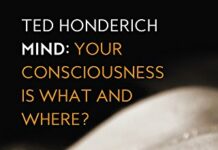
Ebook Info
- Published: 1993
- Number of pages: 160 pages
- Format: PDF
- File Size: 1.86 MB
- Authors: Ted Honderich
Description
A concise introduction to one of the central questions of philosophy for students and general readers, this book asks the question, “Are we subject to determinism or do we possess Free Will and thus responsibility for our actions?” The first six chapters of the book deal with the rival claims of the two theories, and investigate whether either of them is clear, consistent, complete, and demonstrably true. The inquiry in itself amounts to a complete philosophy of mind. The last four chapters deal with the implications of determinism and its significance in our public and private actions. Honderich examines the doctrines of compatibilism, which argues that we are subject to causation but are nevertheless free, and incompatibilism, which sees determinism and freedom as mutually exclusive. This debate has been one of philosophy’s main battlegrounds for centuries, with thinkers as distinguished as Hume and Kant in opposite camps.
User’s Reviews
Reviews from Amazon users which were colected at the time this book was published on the website:
⭐Ted Honderich, a British philosophy professor, is the leading proponent in our time of the doctrine known as determinism (sometimes, and perhaps more accurately, called “predeterminism”). His most elaborate treatment of this issue was in his 1988 tome, A Theory of Determinism: The Mind, Neuroscience, and Life (Oxford University Press). But, as he explains in this second edition (2002) of his book How Free Are You?: The Determinism Problem, “I’ve had some second thoughts,” and this second edition “goes further than its large predecessor and also than the first edition of itself” (7). Accordingly, the present review focuses on this second edition of How Free Are You?, and the page numbers cited in textual parentheses refer to that edition.Honderich defines “determinism” as “a theory that all our mental events, including choices and decisions, and also our actions, are effects of certain things and therefore have to happen or are necessitated, and cannot be owed to origination” (155). He defines “free will” as “a kind or part of freedom that is or rests on our supposed personal power to originate choices and thus actions—i.e. origination as a power; sometimes used more generally” (156). Accordingly, if determinism, as defined by Honderich, exists, free will does not. Indeed, the premise of his book is that free will does not exist.Honderich concludes that “taking in account everything, determinism is very strongly supported, and that certainly it has not been shown to be false. It will be no news to you that I myself do think determinism is true, but that thought does seem even to me to go a bit beyond the evidence” (90 [italics omitted as incompatible with this internet platform]). “Furthermore, . . . it does not matter if determinism is true or false, since there is no serious idea with which it conflicts. The question of its truth does not need looking into. That was time wasted” (103 [citation omitted]).This is an astonishing position for a philosophy professor to take. He feels no need to demonstrate the truth of determinism, because the advocates of free will cannot, in his view, absolutely and scientifically prove the case for free will. As with so many determinist opponents of free will, he attempts to place the burden of proof on the advocates of free will, notwithstanding the fact that a belief in some kind of free will is consistent with human experience whereas a belief in (pre)determinism with regard to human choices and decisions is counterintuitive.Honderich teaches that all “events” (including all mental operations) are strictly a matter of physical cause and effect. Ergo, all our thoughts are caused by other physical events—ultimately events outside of ourselves going back to the beginning of time. Everything is predetermined. Determinism is “the question of whether your choosing this book and your reading this sentence now, or your deciding to move in with someone or get divorced, is just a matter of cause and effect” (1). He believes that the answer to this question is in the affirmative.Honderich is aware that quantum physics claims to have discovered a world governed by indeterministic rather than deterministic principles, but he denies that such indeterminism is ontologically real (74–75). In any event, he argues, like many determinists, that any such phenomena would be of no account at the level of human choices and decisions:“The same question of consequences, by the way, is raised by something perhaps more widely accepted than determinism. That is near-determinism. Maybe it should have been called determinism-where-it-matters. It allows that there is or may be some indeterminism but only at what is called the micro-level of our existence, the level of the small particles of our bodies, particles of the kind studied by physics. At the ordinary level of choices and actions, and even ordinary electrochemical activity in our brains, causal laws govern what happens. It’s all cause and effect in what you might call real life.” (5 [italics omitted as incompatible with this internet platform])Honderich’s view that quantum mechanics applies only to the microworld is a standard trope among determinists. In contrast, quantum physicist Henry P. Stapp states: “The oft-heard claim that ‘quantum mechanics is not relevant to the mind-brain problem because quantum theory is only about tiny things’, is absolutely contrary to the basic quantum principles” (Henry P. Stapp, Quantum Theory and Free Will: How Mental Intentions Translate into Bodily Actions [Cham, SZ: Springer, 2017], 13). In this and other writings Stapp challenges the central premises of determinism, especially the notion that the entire universe, including life, is governed solely by physical cause and effect.Additionally, Honderich and other determinists wrote their major works before the publication of relevant books by neuroscientists William R. (W. R.) Klemm and Peter Ulric Tse and philosopher-scientist Bob Doyle. These and other authors present alternatives to the determinist/predeterminist assumptions of Honderich and his intellectual kin—alternatives that are based on science, evidence, and reason and not on religious presuppositions.Chapter 11 of Honderich’s book evinces, among other things, his hatred of retribution as a basis for criminal punishment. In this and other writings, he is passionately opposed to any notion of retribution as a legitimate consideration in criminal or social matters. To consign retribution to oblivion, he proposes to replace any notion of free will with the doctrine of determinism: if the criminal was predetermined to commit the crime, he/she cannot be responsible for it. This is the equivalent of killing a fly with a hydrogen bomb. There are several approaches to criminal punishment: retribution, deterrence, societal protection, and rehabilitation. Some criminal law theorists oppose retribution as a basis for criminal law without any reference to determinism (see Wayne R. LaFave and Austin W. Scott Jr., Criminal Law [St. Paul, MN: West, 1972], 24). Although good arguments can be made against retribution, it must also be kept in mind that the social contract involves the assumption by government of the formerly private right of retribution/retaliation. See John Locke’s Second Treatise of Government. Expelling retribution from the criminal law might result in a return to private retaliation—the kind of private justice still accepted in some societies. Honderich’s project of eliminating retribution by means of indoctrination in determinist lore is a fool’s errand. People are less likely to accept determinism than to rethink the wisdom vel non of retribution. Moreover, if (pre)determinism is true, both crime and punishment are inevitable: it’s all a matter of cause and effect, don’t you know.(revised October 30, 2019)
⭐I have been a firm believer in determinism for a very long time… And ive read my fair share of philosophical literature on the subject… I was a little disappointed with this book… I was expecting more… No new ideas but if you know nothing about determinism its a good start to look here… However, I feel that the articles in Poijmans, introduction to philosophy text book are better…This book did shed some new light for me on compatibalism… ie, some say that free will and determinism are compatibale because the agent wants what his deterministic nature wants…. and some say that they are not compatible because the agent did not originate his deterministic attributes, even though he does agree with them…The book also lifts the person back up after they have fallen into the mind quaking fear of determinism. It does a good job at that..The idea of determinism, thanks to neurology, will be the next revolution in culture… Darwin has a rival for the spotlight…Because this theory is the next revolution in intellectual thought and because this book is at least an excellent introduction to determinism i give this book full stars…Watch for my book on determinism… ha ha!!!
⭐An introductory book about free-will vs determinism. For Honderich, determinism wins over free-will. Basically, the argument goes: our choices are caused; causation implies necessary relations between distinct entities; thus, if antecdents in a necessary relation holds, the resultant choice could not have been otherwise; there is no freedom (in the sense of self-originating choice) in this; thus there is no free-will.Being an introduction, it is scant on references to contemporary authors or the details of contemporary debates. For this reason, some of his arguments skip over, without notice, some objections that could be made. E.g. Honderich takes explanation to always and only be about ontologically necessary relations. Some argue that such relations are neither logically necessary nor sufficient for explanation. Another e.g., Honderich’s preferred Union Theory of the Mind-Body relation leaves aside the question of what precisely ‘mental events’ are. He tells us they are ‘real’ and so located in time-space, and also tells us they are not physical per se, but does not tell us what more they are than that, thereby leaving us with the ‘hard problem’ of what their precise nature is.Given his determinism, Honderich’s account of what ‘free choices’ amounts to is reasonable enough. Roughly, if you are not coercised, not under the influence of mind-altering substances, have an active intention in mind, etc., then your action was a ‘free’ one. It seems to me that difficulties with this arise if you starts wondering whether your intention is really ‘your own’ … ironically, as philosophers more than anyone are wont to do.Honderich’s arguments are given in detail in his book, ”
⭐”.
⭐great book
⭐Required reading at A2 hence 5 stars, but personally (okay I have to be neutral as a teacher!) would have given the author 1 star for trying to promote a false idea of hard determinism
⭐Apparently I have no real choice about writing this or you about reading it! Our consciousness is just a passenger along for a one way ride. this is a fascinating idea and has been dominant in philosophy for eons – the problem for free willers is that modern neuroscience just adds more and more weight to the argument. Personally I find the idea persuasive and fully intend to just enjoy the ride for the rest of my life!
Keywords
Free Download How Free Are You?: The Determinism Problem in PDF format
How Free Are You?: The Determinism Problem PDF Free Download
Download How Free Are You?: The Determinism Problem 1993 PDF Free
How Free Are You?: The Determinism Problem 1993 PDF Free Download
Download How Free Are You?: The Determinism Problem PDF
Free Download Ebook How Free Are You?: The Determinism Problem




